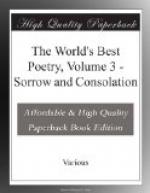Had not the western glory then
Stolen through the latticed room,
Her funeral raiment would have shed
A more heart-breaking gloom;
Had not a dimpled convent-maid
Hung in the doorway, half afraid,
And left the melancholy place
Bright with her blush and bloom!
Beside the gilded harp she stood,
And through the singing strings
Wound those wan hands of folded prayer
In murmurous preludings.
Then, like a voice, the harp rang high
Its melody, as climb the sky,
Melting against the melting blue,
Some bird’s vibrating wings.
Ah, why, of all the songs that grow
Forever tenderer,
Chose she that passionate refrain
Where lovers ’mid the stir
Of wassailers that round them pass
Hide their sweet secret? Now, alas,
In her nun’s habit, coifed and veiled,
What meant that song to her!
Slowly the western ray forsook
The statue in its shrine;
A sense of tears thrilled all the air
Along the purpling line.
Earth seemed a place of graves that rang
To hollow footsteps, while she sang,
“Drink to me only with thine eyes.
And I will pledge with mine!”
HARRIET PRESCOTT SPOFFORD.
FIDELITY IN DOUBT.
Come, lady, to my song incline,
The last that shall assail thine ear.
None other cares my strains to hear,
And scarce thou feign’st thyself therewith delighted!
Nor know I well if I am loved or slighted;
But this I know, thou radiant one and sweet,
That, loved or spurned, I die before thy feet!
Yea, I will yield this life of mine
In every deed, if cause appear,
Without another boon to cheer.
Honor it is to be by thee incited
To any deed; and I, when most benighted
By doubt, remind me that times change and fleet,
And brave men still do their occasion meet.
From the French of GUIRAUD LEROUX.
Translation of HARRIET WATERS PRESTON.
FAITH.
Better trust all and be deceived,
And weep that trust and that deceiving,
Than doubt one heart that, if believed,
Had blessed one’s life with true believing.
O, in this mocking world too fast
The doubting fiend o’ertakes our youth;
Better be cheated to the last
Than lose the blessed hope of truth.
FRANCES ANNE KEMBLE-BUTLER.
* * * * *
II. PARTING AND ABSENCE
PARTING.
If thou dost bid thy friend farewell,
But for one night though that farewell may be,
Press thou his hand in thine.
How canst thou tell how far from thee
Fate or caprice may lead his steps ere that to-morrow
comes?
Men have been known to lightly turn the corner of
a street,
And days have grown to months, and months to lagging




